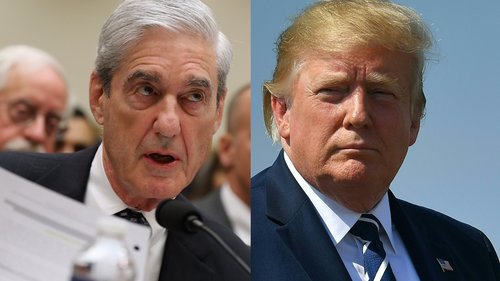U.S. House now investigating whether Trump lied to Mueller

WASHINGTON, DC — The U.S. House of Representatives is now investigating whether President Donald Trump lied to special counsel Robert Mueller in written answers he provided in the Russia investigation, the House’s general counsel said in federal court Monday.
“Did the President lie? Was the President not truthful in his responses to the Mueller investigation?” House general counsel Douglas Letter told the U.S. Court of Appeals for the District of Columbia Circuit about why the House now needs access to grand jury material Mueller collected in his investigation.
The House’s arguments Monday draw new focus to whether Trump had lied to Mueller following public revelations at Roger Stone’s trial this month.
Former Trump deputy campaign chairman Rick Gates testified that Trump and Stone talked about information that was coming that could help the campaign in mid-2016, at a time when Stone was attempting to get secret details about stolen Democratic documents WikiLeaks had.
Former Trump campaign chairman Paul Manafort also apparently told the Mueller grand jury what Trump’s approach to WikiLeaks had been in 2016, according to the Mueller report.
But Trump told Mueller in his written statements he didn’t recall discussing WikiLeaks with Stone.
The Gates testimony adds further significance to Congress’ desire to see the redacted material.
The question of whether Trump obstructed justice, including potentially lying to Mueller, has for months been a part of the House Judiciary Committee’s wider review of potential obstruction in the wake of the Mueller report. The House previously reviewed most of what Mueller had written in his final report, including parts kept from the public.
But the House hasn’t been able to see what Manafort told the grand jury, which Mueller apparently described in his report. In the Mueller report, grand jury details are redacted related to a sentence describing Manafort speaking with Trump after WikiLeaks’ first release, in July 2016.
Manafort’s “situation shows so clearly that there is evidence, very sadly, that the President might have provided untruthful answers and this is a key part of the impeachment inquiry,” Letter said Monday in the last words of his arguments to the three-judge appellate panel.
Judge Judith Rogers on Monday expressed skepticism about the Justice Department’s reasoning for withholding the Manafort information from the House now.
“Why wouldn’t the department favor giving this information because arguably it would show he did nothing wrong? The House would not want to return a charge where the evidence didn’t support it,” she said about the impeachment inquiry. Another judge on the panel, Thomas Griffith, questioned why the House needed the information. And the third judge, Neomi Rao, whom Trump appointed, asked whether the courts should be involved in releasing information to the House that could influence an impeachment investigation.
The court case revolves around what federal investigative information the House should be able to access during impeachment and what federal courts may do in a dispute between the House and the executive branch.
